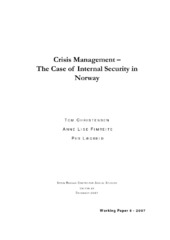| dc.contributor.author | Christensen, Tom | eng |
| dc.contributor.author | Fimreite, Anne Lise | eng |
| dc.contributor.author | Lægreid, Per | eng |
| dc.date.accessioned | 2007-12-10T13:32:10Z | |
| dc.date.accessioned | 2020-12-10T06:32:02Z | |
| dc.date.available | 2007-12-10T13:32:10Z | |
| dc.date.available | 2020-12-10T06:32:02Z | |
| dc.date.issued | 2007-12 | eng |
| dc.identifier.issn | 1503-0946 | |
| dc.identifier.uri | https://hdl.handle.net/1956/2485 | |
| dc.description.abstract | This paper describe and explain citizens’ and civil servants’ perceptions of how able government bodies are to prevent and handle crises. The explanatory factors are trust, cultural, political, structural and demographic features. The empirical data base is two Norwegian surveys, one to the citizens and one to civil servants. The major findings are that citizens have a rather high general trust in government ability to handle and prevent crises and that there are no big differences between the general public and the government regarding their perception of crisis management. Political efficacy is the main explanatory variable among the citizens and policy area, perceived coordinative capability and mutual trust among the civil servants. | en_US |
| dc.language.iso | eng | eng |
| dc.publisher | Stein Rokkan Centre for Social Studies | eng |
| dc.relation.ispartofseries | Working Paper | en |
| dc.relation.ispartofseries | 8-2007 | en |
| dc.title | Crisis Management – The Case of Internal Security in Norway | eng |
| dc.type | Working paper | eng |
| dc.subject.nsi | VDP::Samfunnsvitenskap: 200 | nob |
